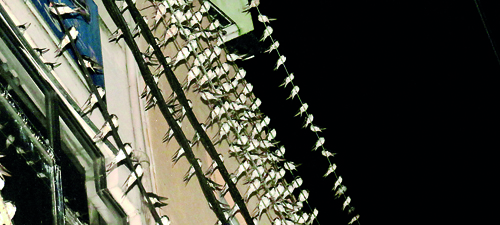News
Winged migrants back on their round-the-world ticket
The Uva Provincial Council election was held yesterday, giving election monitors a tough time, and some international observers were getting a bird’s-eye view of the political goings-on – the annual great bird migratory season has begun over Sri Lanka.
Marking the onset of the season, the distinctive blue-topped barn swallows from the northern hemisphere that fly to Sri Lanka to roost in their thousands on the power-lines in Ratnapura are back.

The Barn Swallows are back in Ratnapura. Pic by Athula Edirisinghe
A birdwatcher in Ratnapura, Athula Edirisinghe, said the barn swallows began appearing in the town on September 8. Reports from Matugama also indicate that the barn swallows are back but that the population has not yet reached its peak, indicating that more birds are on their way.
The barn swallow colony in Ratnapura has been an iconic spectacle for decades. During their stay here, these small birds start arriving in the town at dusk and settling on the electric wires before take wing in the morning. Mr. Edirisinghe records changes in their numbers on days of heavy rain.
More than 200 species of birds migrate every year to Sri Lanka. This migratory season usually starts at the end of August and ends around April. The arrival period differs between species but most birds arrive in Sri Lanka during September and October.
Some of these migrants will settle in our own gardens and open areas located even some in the heart of urban centres.
Among them, the blue-tailed bee-eaters have already started arriving, and many more have flights scheduled over the next few weeks. The brown flycatcher, forest wagtail, brown shrike and the Indian paradise flycatcher are some of the birds that can even settle in your gardens.
As the migrant arrival began, the Field Ornithology Group of Sri Lanka (FOGSL) based in the University of Colombo launched its annual programme, MigrantWATCH 2014/15. It is aimed at promoting observation of migrant birds and also trying to help the exhausted travellers.
The Indian pitta (avichchiya) is one bird that has been found exhausted during past migratory seasons.
Such birds should be protected from dogs, cats, rats, crows and birds of prey such as shikras, and monitored to see whether they recover. If found to be too weak, such a bird should be kept in a dark, quiet, confined place such as a well-ventilated cardboard box. Handle it gently, and only if necessary, If it is too weak to fly on its own, try giving it small amounts of low concentrated glucose saline with vitamin C.
In countries such as the United States, it has been found that thousands of migratory birds die by striking high-rise buildings in flight. Many high-rise buildings have come up in cities such as Colombo, most with lots of glass windows and illuminated at night. In other countries, actions such as dimming high-rise building lights during the onset and end of migratory seasons are being carried out to minimise the hazard to the birds.
Some of the high-rise buildings in Sri Lanka could be in the paths used by migratory birds and could cause them harm if they accidentally crash into the glass towers.
It would be very helpful to collect data on such eventualities that could be fed into any action plans. If your workplace is in a multi-storey building, try questioning cleaning staff about whether they find dead or injured birds that have collided with these buildings. Any information could be passed on to the MigrantWATCH team through email (migrantwatch.srilanka@gmail.com) or by calling 0718440144/ 0712289022. FOGSL also invites members of the public to take photographs of the birds and share them if possible for positive identification.
| Public lecture
As part of MigrantWATCH 2014/15, the Field Ornithology Group of Sri Lanka (FOGSL) has organised a lecture on migrant birds followed by a birding session at Thalangama specially for those who are new to birding. aof the Department of Zoology, University of Colombo, at 9.30am on Saturday, September 27. |

